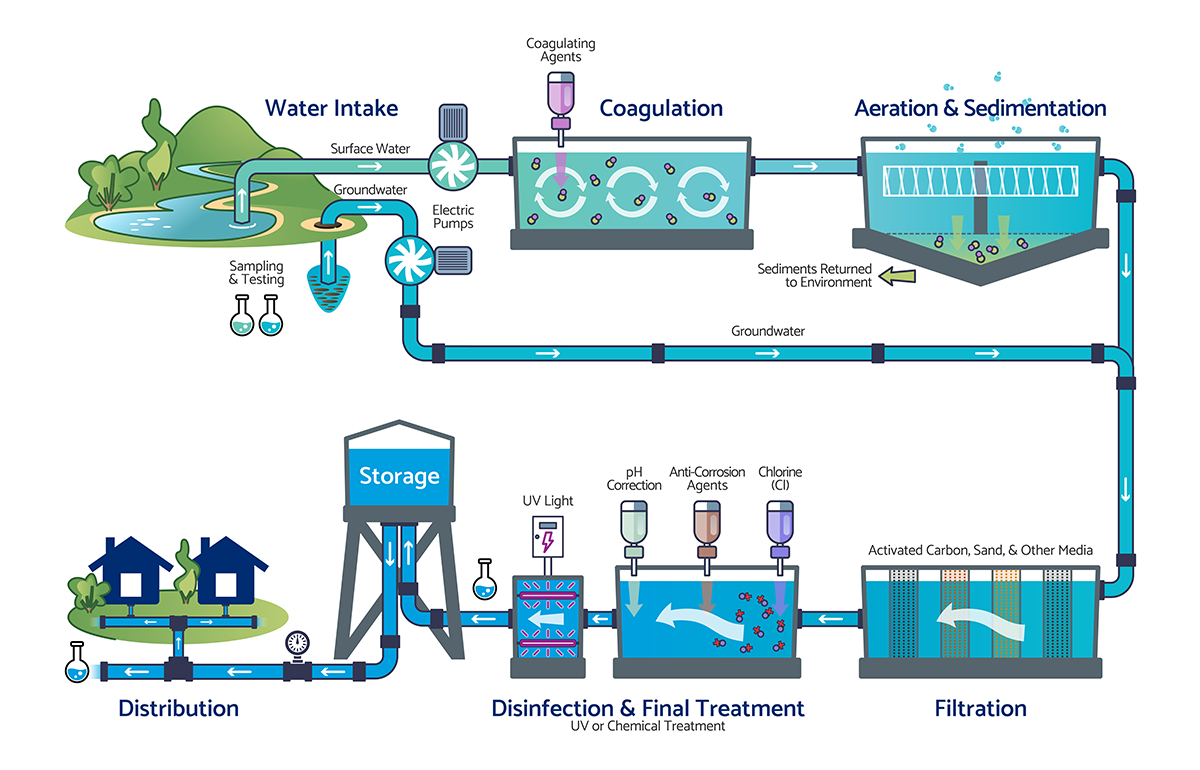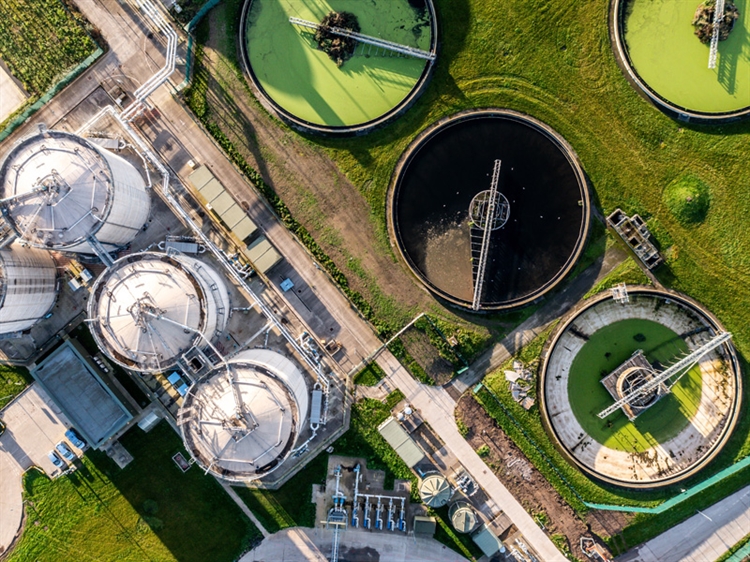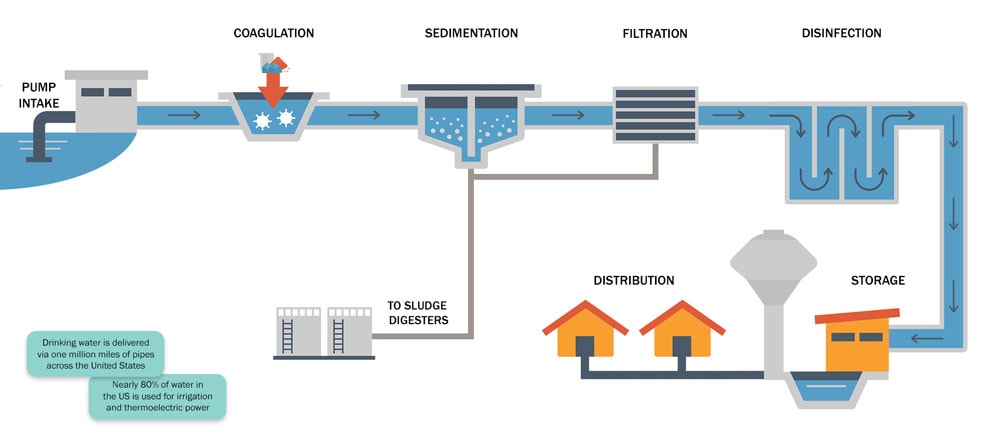Checking Out Water Technology Startups: Just How They Reinvent Lasting Solutions
Water Technology start-ups are becoming critical gamers in the mission for lasting options to global water issues. These companies leverage innovative technologies to improve water effectiveness and monitoring. Their contributions address pressing difficulties such as shortage and contamination. Nevertheless, in spite of their potential, they face numerous obstacles that might affect their success. Comprehending these characteristics sheds light on the future of water sustainability and the duty these startups might play fit it.
The Relevance of Water Technology in Today's Globe
As international water deficiency escalates, the significance of water Technology ends up being progressively apparent. Water Technology plays an important duty in attending to the challenges positioned by raising and diminishing freshwater resources demand. It includes a broad range of technologies, including sophisticated purification systems, wastewater treatment innovations, and smart watering services. These advancements not only improve the performance of water usage however additionally promote sustainable methods across different sectors, consisting of agriculture, market, and metropolitan growth.
Additionally, the importance of water Technology extends past resource monitoring. It promotes durability against environment modification influences, such as dry spells and floodings, by supplying flexible remedies for water preservation and management. In addition, it sustains public wellness by ensuring accessibility to secure and clean drinking water. As the globe encounters expanding water-related difficulties, the integration of sophisticated water technologies is essential for promoting sustainable growth and securing water availability for future generations.
Innovative Solutions From Water Tech Startups
While typical techniques to water monitoring have served their function, a new age of water technology start-ups is reinventing the sector with ingenious services (Water Technology Startups). These firms utilize innovative technologies to address pushing water concerns, such as scarcity, contamination, and inefficient distribution. Many start-ups use artificial knowledge and maker understanding to maximize water use and forecast need, leading to even more sustainable practices
Additionally, a number of companies concentrate on creating innovative purification systems that get rid of contaminants and make water secure for consumption. Others check out decentralized water therapy innovations, enabling neighborhoods to manage their water sources extra successfully. Some startups are pioneering clever watering options that lessen water waste in farming, advertising ecological conservation.
Case Researches: Effective Water Technology Startups
Various water Technology start-ups have emerged as leaders in resolving worldwide water obstacles via ingenious strategies. One remarkable example is Xylem, which focuses on water analytics and clever facilities to maximize water usage and reduce waste. Their options have been executed in different districts, showing significant enhancements in water monitoring efficiency.
An additional successful startup, No Mass Water, has actually created solar-powered hydropanels that draw out water vapor from the air, offering lasting alcohol consumption water in deserts. Water Technology Startups. This Technology has been deployed in numerous countries, guaranteeing communities have accessibility to clean water
AquaVenture Holdings runs a diverse profile of water-as-a-service services, addressing water scarcity via desalination and wastewater therapy. Their jobs have proven crucial in areas facing extreme water scarcities, showcasing the capacity of innovative water innovations to produce long-term, favorable impacts. These study highlight the transformative possibility of startups in the water Technology field.
The Duty of Smart Technology in Water Monitoring
Smart Technology plays an important function in modern-day water monitoring by leveraging IoT applications to enhance source use. Information analytics improves performance by providing actionable understandings, while remote monitoring remedies enable real-time oversight of water systems. Together, these advancements transform exactly how water is handled, promoting sustainability and operational effectiveness.
IoT Applications in Water
As water shortage and monitoring challenges heighten worldwide, the combination of Web of Things (IoT) applications has become an essential solution in enhancing water sources. IoT Technology helps with real-time tracking and evaluation of water systems, making it possible for much more reliable usage and management. Sensing units released in numerous water facilities can track quality, flow prices, and leak, giving important data to stakeholders. This data encourages utilities and consumers to make informed choices, minimizing waste and improving preservation efforts. Additionally, clever irrigation systems utilize IoT to maximize water distribution for agriculture, making sure that crops obtain the best quantity of water at the ideal time. Generally, IoT applications are transforming conventional water monitoring methods, promoting sustainability and resilience in water source systems.
Information Analytics for Efficiency
Using data analytics is important for boosting effectiveness in water monitoring. Water Technology start-ups are progressively using advanced analytics to maximize source appropriation and minimize waste. By analyzing information from various resources, these startups can determine patterns and fads that educate better decision-making. Predictive analytics can forecast water need, permitting utilities to readjust supply get redirected here as necessary, thus decreasing shortages and excess. Additionally, real-time information handling makes it possible for the immediate detection of leaks and ineffectiveness within distribution systems, substantially decreasing operational expenses. In addition, data-driven understandings encourage stakeholders to apply targeted conservation approaches, fostering sustainable techniques. Fundamentally, incorporating information analytics right into water administration not only streamlines procedures however additionally advertises long-lasting sustainability in water source use.
Remote Tracking Solutions
While traditional water administration systems commonly deal with ineffectiveness, remote tracking solutions are transforming how water sources are managed. These cutting-edge technologies enable real-time information collection and evaluation, allowing stakeholders to keep track of water top quality, circulation prices, and usage patterns from afar. Utilizing sensing units and IoT devices, remote monitoring offers immediate insights that assist in proactive decision-making. This change not just enhances operational performance but likewise advertises sustainability by lowering water waste and optimizing source appropriation. In addition, remote tracking systems can recognize prospective issues prior to they escalate, thereby decreasing the threat of contamination or framework failing. As water Technology start-ups remain to create these remedies, the sector is positioned for substantial innovations in sustainable water monitoring techniques.
Obstacles Dealing With Water Technology Startups
Water Technology start-ups experience significant difficulties that can impede their development and success. Secret problems include safeguarding adequate financing, maneuvering through complicated governing atmospheres, and contending in a jampacked market. These obstacles call for critical planning and innovation to get rid of.
Financing and Financial Investment Hurdles
Advancement in water Technology holds enormous possibility for resolving global difficulties, start-ups check out here in this market typically face substantial funding and investment hurdles. Lots of investors stay careful, regarding the water market as risky as a result of its complicated regulative landscape and lengthy growth timelines. In addition, start-ups typically battle to show immediate earnings, which can prevent possible backers. Traditional equity capital may ignore water modern technology, favoring sectors with quicker returns, such as technology or durable goods. In addition, securing grants and federal government funding can be time-consuming and competitive, further making complex monetary security. Water Technology Startups. Consequently, lots of cutting-edge water Technology start-ups find themselves in a ragged edge, requiring innovative funding strategies to navigate these monetary barriers and achieve their goals
Governing Compliance Issues
Steering regulatory compliance is a significant challenge for startups in the water Technology market, as they should face a myriad of neighborhood, nationwide, and worldwide policies. These regulations commonly include water quality requirements, ecological security regulations, and safety protocols, which can differ commonly across territories. Startups may discover it tough to browse this facility landscape, specifically when scaling operations or entering brand-new markets. The costs connected with conformity can be considerable, drawing away resources far from development and item advancement. Furthermore, hold-ups in getting required authorizations or certifications can prevent growth and market access. A durable understanding of regulatory structures is necessary for these startups to ensure lasting operations and stay clear of prospective lawful repercussions.
Market Competition Dynamics
As water Technology start-ups arise in a competitive landscape, they encounter many obstacles that can restrain their growth and advancement. Established firms commonly control the market, leveraging sources and experience to preserve their positions. Startups battle with minimal funding, which restricts r & d capacities, making it tough to complete on Technology and prices. Additionally, the rapidly developing nature of water technologies needs continuous adaptation, more straining start-up resources. Governing obstacles can make complex market access, as compliance with environmental requirements is crucial yet costly. Bring in proficient ability in a niche area offers an additional barrier, as larger companies may provide more attractive employment bundles. Consequently, these variables create a complex environment for water Technology startups intending to succeed.

The Future of Water Technology and Sustainability

The future of water Technology will likely concentrate on integrating expert system and data analytics to maximize water circulation and usage patterns. By utilizing real-time information, companies can anticipate shortages and manage sources extra properly. In addition, sustainable methods will certainly end up being a keystone of the industry, motivating circular economic situations where water is reused and dealt with. Ultimately, the continued development of water Technology will be important in producing resistant infrastructures efficient in meeting the challenges posed by environment change and population growth while promoting ecological stewardship.
Frequently Asked Concerns
What Are the Key Metrics for Examining Water Technology Startups?
Key metrics for evaluating water Technology startups include market potential, scalability, consumer procurement expenses, profits growth, technology advancement, regulative compliance, environmental effect, competitive benefit, and group knowledge, all crucial for figuring out long-term viability and success.
How Can Individuals Assistance Water Technology Innovations?
People can sustain water Technology innovations by spending in startups, promoting for plan changes, joining neighborhood efforts, sharing knowledge about sustainable practices, and promoting recognition of water issues with social networks and local events.
What Are Usual Financing Sources for Water Tech Startups?
Typical financing resources for water tech startups consist of endeavor funding, government gives, crowdfunding platforms, angel financiers, and business collaborations. These monetary avenues help assist in technology and advancement in lasting water management innovations.

Which Industries Advantage A Lot Of From Water Technology Advancements?
Industries such as farming, energy, production, and local solutions benefit more significantly from water Technology developments. These technologies boost water performance, minimize expenses, and promote lasting practices, inevitably adding to ecological preservation and source monitoring.
Exist Any Regulative Obstacles Particular to Water Modern Technology?
Yes, water Technology faces regulatory challenges, consisting of compliance with environmental criteria, permitting processes, and varying regional policies. These intricacies can prevent development and slow down the execution of brand-new technologies in the water administration sector.
Water Technology start-ups are arising as crucial gamers in the mission for sustainable remedies to worldwide water issues. As international water scarcity intensifies, the relevance of water Technology comes to be significantly noticeable. Others check out decentralized water treatment technologies, enabling communities to handle their water resources a lot more effectively. An additional effective start-up, Absolutely no Mass Water, has established solar-powered hydropanels that draw out water vapor from the air, offering sustainable alcohol consumption water in arid areas. Their tasks have actually shown essential in areas encountering severe water scarcities, showcasing the potential of cutting-edge water innovations to create enduring, positive influences.